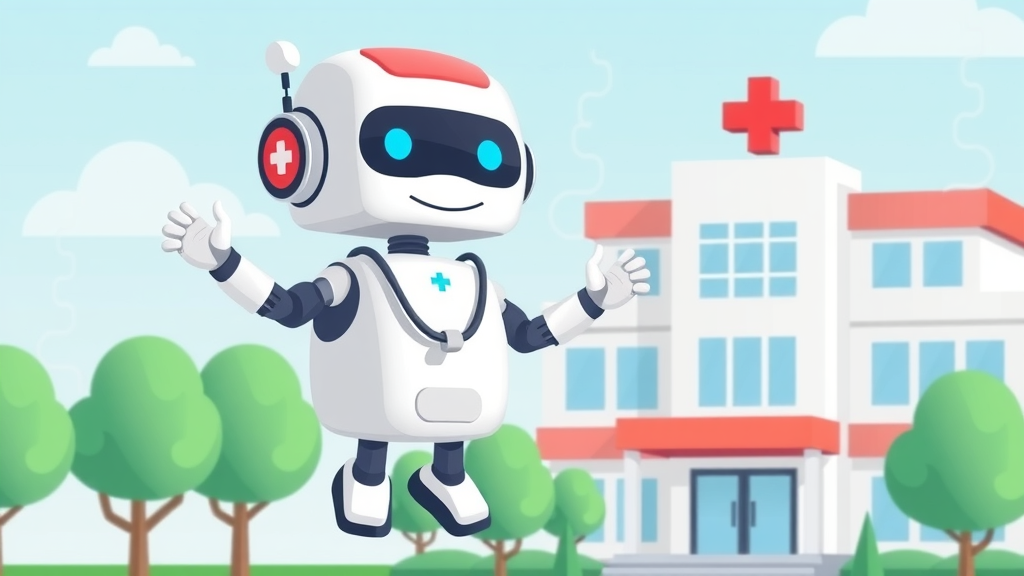
Exploring The Potential of AI Voice Chatbots in Healthcare
In the rapidly advancing healthcare industry, AI voice chatbots are emerging as pivotal tools in transforming patient experiences. These conversational AI solutions are crafted to improve interactions between patients and healthcare providers, ensuring smoother operations and personalized care. The versatility of AI chatbots allows them to tackle various challenges faced by the healthcare sector, from reducing administrative burdens to enhancing patient engagement.
What AI Voice Chatbots Bring to the Healthcare Environment
AI voice chatbots in healthcare offer many benefits, particularly enhancing operational efficiency. They work as virtual assistants, aiding in tasks such as appointment scheduling, managing patient inquiries, and providing necessary information swiftly. They empower healthcare providers by allowing them to focus more on direct patient care, fostering improved patient interactions and outcomes.
Streamlining Communications Between Patients and Healthcare Providers
Effective communication is vital in healthcare settings. AI chatbots act as intermediaries, ensuring that patient queries are addressed promptly and accurately. They are available 24/7, reducing wait times and ensuring that patients receive the attention they deserve without delay. This accessibility boosts patient satisfaction and ensures that healthcare services are delivered efficiently.
Increasing Patient Satisfaction with Personalized Care through AI Chatbots
Personalized care is a cornerstone of high-quality healthcare services. AI chatbots leverage natural language processing to customize interactions based on patient needs. By understanding individual preferences and history, chatbots can tailor responses that enhance the overall patient experience. This personalized approach fosters trust and reliability, which are indispensable elements in patient-provider relationships.

AI Chatbots and Their Role in Patient Engagement
Enhancing Patient Engagement with Conversational AI
AI chatbots drive patient engagement by offering timely reminders, health tips, and updates about upcoming appointments. Such proactive communication encourages patients to be more involved in their health management, leading to better adherence to treatment plans and healthier outcomes. This interactive nature of chatbots keeps patients informed and engaged.
Reducing Administrative Burden and Improving Patient Data Management
By automating routine inquiries and data collection, AI chatbots significantly cut down on the administrative burden. They ensure that patient data is organized and easily accessible for healthcare professionals, minimizing errors and saving valuable time. This capability allows staff to dedicate more attention to critical tasks, enhancing the overall efficiency of the healthcare system.
Unlocking Efficiencies in Appointment Scheduling and Patient Communications
AI chatbots streamline appointment scheduling by integrating seamlessly with existing calendar systems to coordinate patient visits effectively. Patients can schedule, reschedule, or cancel appointments without the need for direct human interaction, offering convenience and simplicity. This autonomy improves the workflow at medical practices, reducing congestion and optimizing staff allocation.

Understanding the Current Use of AI Chatbots in the Healthcare Industry
How AI Chatbots Are Transforming Healthcare Services
The integration of AI chatbots into healthcare systems has substantially elevated the standard of care by automating mundane tasks and ensuring constant availability to patients. Chatbots contribute to more patient-centered healthcare services by providing accurate, instant responses to routine inquiries, freeing up doctors to focus more on complex patient issues.
The Role of AI Chatbots in Patient Care and Healthcare Systems
In patient care, AI chatbots serve an integral role in collecting and maintaining comprehensive patient data. They facilitate the delivery of efficient healthcare services through enhanced data accuracy and instant information retrieval. This streamlined operation reduces instances of medical errors and improves the overall quality of patient management.
AI Platforms and Their Integration into Healthcare Organizations
Healthcare organizations are increasingly adopting sophisticated AI platforms to integrate AI chatbots. These platforms provide a robust foundation for optimizing workflows, enhancing patient experience, and providing actionable insights into process improvements. Their adaptability makes them indispensable tools in transforming healthcare systems.

The Game-Changers: AI Chatbots in Transforming Patient Experience
Patient Experience Enhancement through AI Technology
AI technology has revolutionized how patients interact with healthcare services, making processes more user-friendly and accessible. Chatbots provide personalized insights and are engineered to adapt to patient needs, thereby enhancing patient experiences by ensuring swift and reliable communication within medical practices.
Creating a Seamless Healthcare System Interface with AI Chatbots
With AI chatbots, the creation of a seamless healthcare system interface becomes attainable. These bots ensure a cohesive interaction between all components of patient care, providing a streamlined approach to healthcare delivery. They work around the clock to coordinate with various departments, ensuring that the patient journey is uninterrupted and efficient.
The Potential of AI in Future Healthcare Innovations
The potential of AI in pioneering future healthcare innovations is boundless. With continuous improvements in AI algorithms and processing capabilities, the healthcare industry stands on the brink of a technological revolution. AI chatbots are set to play a critical role in this transformation, driving advancements in diagnostic capabilities and personalized treatment plans.

Getting Started with AI Voice Chatbots at Your Medical Practice
First Steps in Implementing AI Chatbots in Your Practice
Implementing AI chatbots begins with identifying practice-specific needs and selecting a suitable chatbot technology. Engaging stakeholders to understand solutions and integrating them into daily operations helps in successfully embedding AI systems in healthcare environments.
Choosing the Right AI Platform and Technology Partner
Choosing the right AI platform involves assessing technological requirements, vendor competence, and the ability to integrate with existing healthcare systems. A reliable technology partner is pivotal to achieving smooth implementation and ongoing support.
Ensuring Compliance and Security in AI Implementations
Ensuring AI compliance and security entails adherence to regulations such as HIPAA, focusing on data privacy and protection. Regular audits, employee training, and clear data policies help in maintaining high standards of security in AI implementations.
Measuring Success and Enhancing Practice Operations
Measuring success involves continually evaluating the impact of AI systems on patient satisfaction, operational efficiency, and care outcomes. Using metrics and feedback helps to refine strategies and promote continuous improvement in practice operations.

Conclusion and Final Thoughts
Successfully implementing AI voice chatbots in healthcare starts with thoughtful planning, selecting compliant and reliable tools, and providing proper staff training. As the technology continues to advance, staying proactive and flexible will be key to unlocking its full potential. By embracing AI, medical practices can deliver more personalized, efficient care, enhance patient satisfaction, and streamline daily operations. AI voice chatbots aren't just a trend—they're becoming a foundational element in the future of patient-centered healthcare.
Ready to streamline your patient interactions? Discover how AI voice chatbots can transform your practice—start enhancing patient experience today!

Frequently Asked Questions:
1. What are AI voice chatbots, and how do they work in a medical practice?
AI voice chatbots are conversational tools powered by artificial intelligence that assist with tasks like appointment scheduling, answering patient inquiries, and providing 24/7 support. They enhance communication and streamline operations in medical settings.
2. How can AI voice chatbots improve the patient experience?
They offer timely, personalized responses, reduce wait times, and ensure consistent communication, leading to higher satisfaction and better engagement from patients.
3. Are AI voice chatbots secure and HIPAA-compliant?
Yes, when properly implemented, AI chatbots can meet HIPAA standards. Choosing a compliant platform and training staff are essential for ensuring data privacy and security.
4. What benefits do medical staff gain from using AI chatbots?
AI chatbots reduce administrative workloads by handling repetitive tasks, allowing medical staff to focus more on direct patient care and improving overall efficiency.
5. How do I start integrating an AI voice chatbot into my practice?
Begin by identifying your practice’s needs, selecting a trustworthy AI vendor, ensuring system compatibility, and training your team for smooth implementation and adoption.
 Add Row
Add Row  Add
Add 




Write A Comment